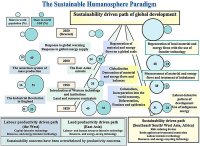Towards the Formulation of a New Paradigm
Details
Over the last two centuries, capitalism diffused worldwide, with the institutional basis of private property rights, and economic actors increasingly regarded land, labour and capital as the three main factors of production. The environment and various resources were often understood as either attachment of land or a factor translatable to it.
But where severe environmental constraints prevail, it is not always appropriate to focus on human efforts to improve the productivity of land and labour. In weighing options and priorities available to local society, it may well be felt that the more urgent task is to secure the livelihood of local people, by responding to changes nature suddenly brings and by preventing catastrophes. They include monsoon failure and the lack of water, shortage of energy, and the prevalence of infectious diseases. Social instabilities and war could follow. That many societies pursue a path of development with these concerns in mind can be confirmed on the site of fieldwork in contemporary Asia and Africa. It had also been a norm for most human societies until a few centuries ago.
If we wish to understand how to deal with global environmental concerns and the issue of energy supply under the trend of population growth in the tropics in the twenty-first century, we need to move from the perspective of the private property rights regime, which aims at efficiency and growth, to that of humanosphere, which takes into account the complex interactions of movable, changeable and transformable resources that affect the sustainability of local environment. And we need to foster the institutions, which will ensure sustainable humanosphere at local, regional and global levels.




